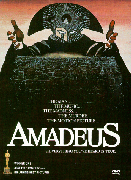|








|
 |
Amadeus (1984)
    
 |
Director:
Milos
Forman |
COUNTRY
USA |
GENRE
Biography/Drama |
NORWEGIAN TITLE
Amadeus |
RUNNING
TIME
161/181 minutes |
|
Producer:
Saul
Zaentz |
Screenwriter (based on his play):
Peter Shaffer |
Review
(English)
When Amadeus was released in
1984, it garnered 11 Academy Awards (winning 8) as well as several other
international awards. And despite the fact that it was a 2.5 hour film
about classical music, it also became a big box-office hit. The stroke
of genius was that Peter Shaffer, who wrote the screenplay based upon
his own successful 1979 stage play, made the most out of a possible
animosity between Mozart and Emperor Joseph II's court composer Antonio
Salieri. According to Shaffer, Salieri was equal portions green with
envy of Mozart's talent, appalled by his lack of class, and in awe of
his
music. And it is through Salieri's bitter, snake-like persona we get to
know the story of Mozart's rise and fall in Vienna, leading to his
position as perhaps the greatest classical composer of all time.
Armed with Shaffer's cleverly concocted plot (which may be at least
partly true), master-director Milos Forman had the perfect basis for
making perhaps the best of his many biopics (which also include latter
classics such as
The
People vs. Larry Flynt and
Man on the Moon). Mozart's
carefree, almost rock-star-ish presence is largely juxtaposed against
his ingenious talent – to our amusement and Salieri's despair. Tom
Hulce, who plays Mozart almost like a giddy queer, manages to find the
balance between the fun Mozart and the serious Mozart, when put to the test in the
more dramatically potent parts. And his interplay with F. Murray Abraham
as Salieri, although limited to just a few scenes, has a smouldering
quality: The young, sly Salieri always seems to be up to something,
which may or may not go completely over Mozart's head, but we cannot
know for certain whether most of it are just fantasies of the old
Salieri. Historically accurate or not – as realized by Abraham, Salieri is a brilliantly
conducted and played character with all the traits of a full-blown, but
still very much human movie-villain.
As in Forman's other great biopics, the director finds a perfect balance
between honouring, almost idolizing the title-character on the one side,
and showing us his unquestionable weaknesses on the other. This is no
idealized image of Mozart – at least not on a human level. He is
wasteful, extravagant, cocky and – not least – self-destructive. But of
course, this is also part of the appeal; what makes him human. His
musical works, on the other hand, are never questioned. And there are
some splendid moments when his musical genius becomes apparent to us
viewers, without the help of Salieri's verification. That being said, I
would personally have preferred a small shift in focus from Mozart's
many operas and to a few more of his piano concertos. Although that is a
matter of taste.
The original theatrical cut of Amadeus runs 161 minutes, 20 minutes less
than a now available "director's cut", which the studio at the time of
release didn't think commercial enough. The director's cut does give
more background to some of the character-relations, but it is a less
tight and more lagging version which I recommend only for fans. The
original version has got all the nerve and tension needed for first-time
viewers. And it manages, even at two and a half hours, to make the life
of the world's most famous classical composer into a fascinating study
of humanity and music, that even youngsters will enjoy to this day.
Click here for original Norwegian review
Re-reviewed: Copyright ©
24.1.2018
Fredrik Gunerius Fevang
Original review: Copyright © 5.5.1997
Fredrik Gunerius Fevang |
|
|
|